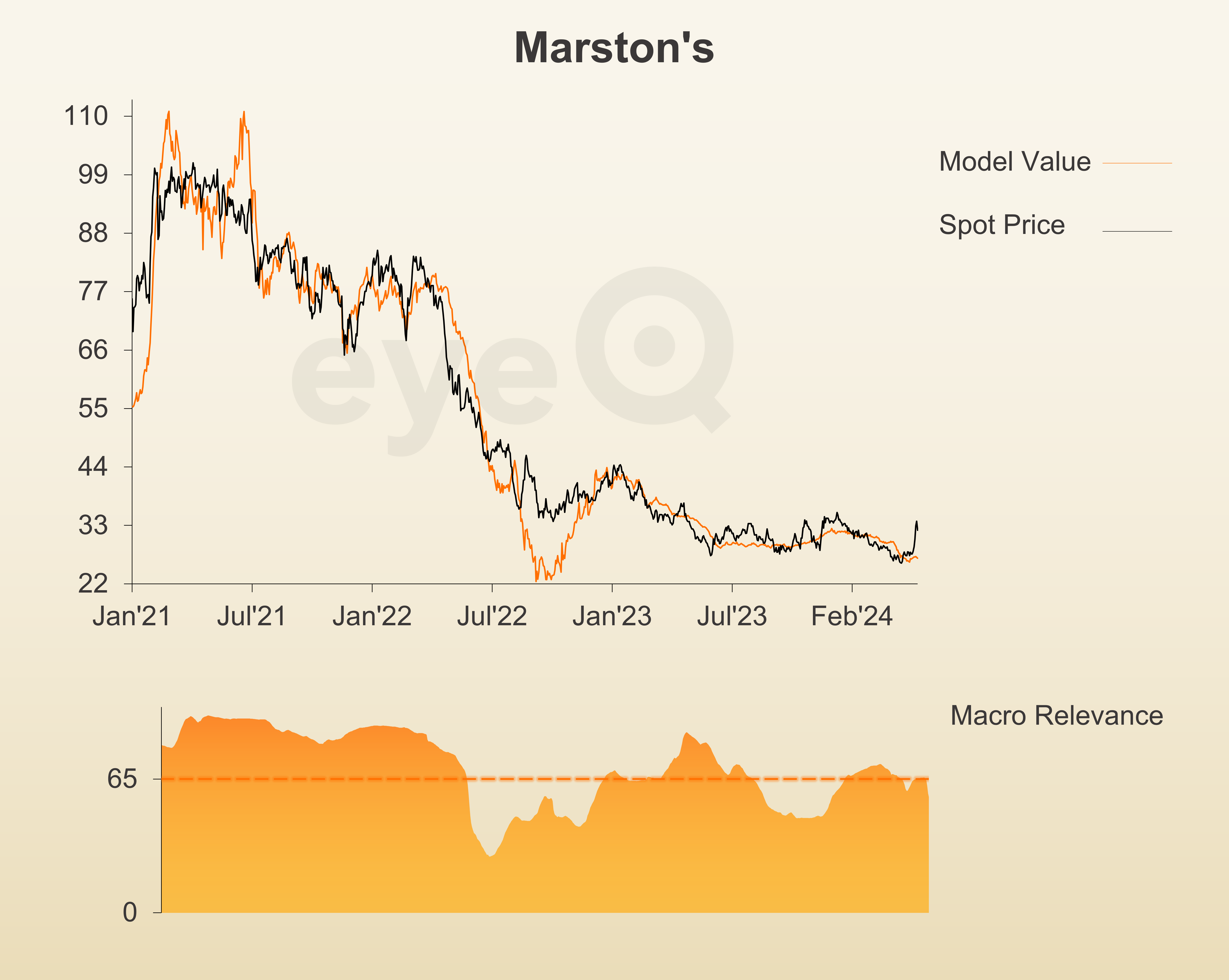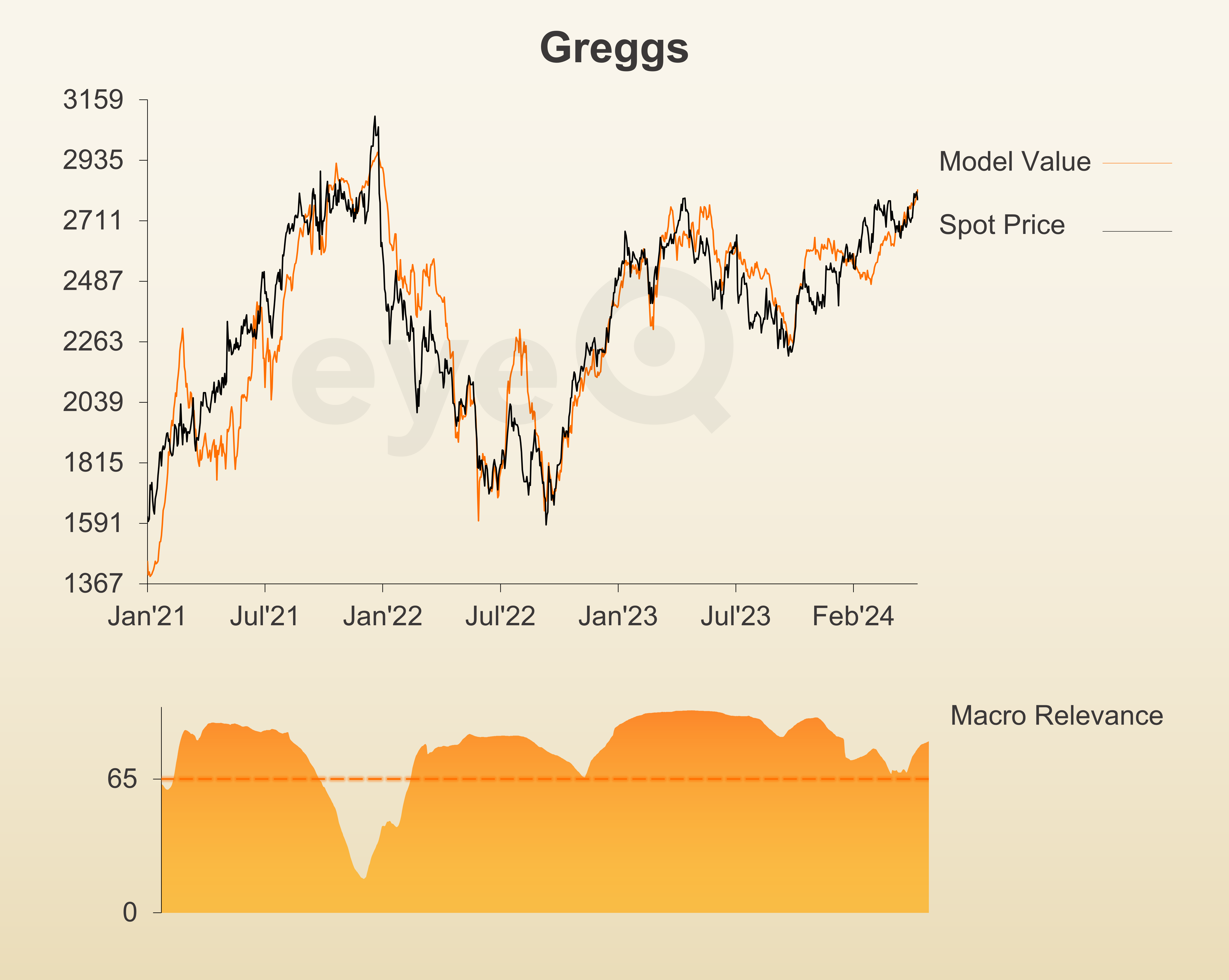eyeQ: shares to bet on UK consumer?
interactive investor has teamed up with the experts at eyeQ who use artificial intelligence and their own smart machine to analyse macro conditions and generate actionable trading signals. This time it analyses two popular stocks.
14th May 2024 11:03
by Huw Roberts from eyeQ

"Our signals are crafted through macro-valuation, trend analysis, and meticulous back-testing. This combination ensures a comprehensive evaluation of an asset's value, market conditions, and historical performance." eyeQ
- Discover: eyeQ analysis explained | eyeQ: our smart machine in action | Glossary
Greggs
Trading signal: long-term strategic model
Model value: 2,825.48p
Fair Value Gap: -1.33% discount to model value
Model relevance: 83%
Data correct as at 14 May 2024. Please click glossary for explanation of terms.
Marston’s
Trading signal: long-term strategic model
Model value: 26.96p
Fair Value Gap: +20.12% premium to model value
Model relevance: 58%
Data correct as at 14 May 2024. Please click glossary for explanation of terms.
There’s been macro and micro news out of the UK this morning.
In terms of macro, Bank of England’s (BoE) chief economist Huw Pill has added to speculation that the first interest rate cut could come as soon as this summer. From a micro perspective, two consumer stocks – Greggs (LSE:GRG) and Marston's (LSE:MARS) – have provided updates on trading conditions.
Greggs saw like-for-like sales grow over 7% in Q1; Marston’s saw strong growth at the start of 2024 and gave positive guidance for the upcoming summer months. But both stocks have sold off a little after the initial positive reaction. That just reflects the fact that both have rallied hard of late.
More strategically, if we pull the two stories together - the BoE is hopefully going to cut rates, mortgage rates will fall and UK consumers should feel a little happier - does that mean consumer stocks are attractive, especially those reporting good news at the company level?
In the case of pub group Marston’s, the short answer is no. There’s a health warning in that macro relevance of 58% means company news is as important as the big picture stuff. But still the strong rally in May has taken the stock 20% above where macro conditions say it “should” be. That suggests a lot of good news is in the price and the risk-reward doesn’t advocate chasing further upside from here.

Source: eyeQ. Past performance is not a guide to future performance.
Gregg’s is a macro play - macro relevance (how confident we are in the model value) is 83% and it’s been in a macro regime for over a year now. This looks more interesting to us.
First, macro model value (where our smart machine says the stock should trade) is firmly trending higher. Big picture stuff like economic growth, inflation, and financial conditions are supportive. Second, it is slightly cheap. To be fair, the Valuation Gap (difference between model value and the current share price) is very small – just 1.33%. Not a huge discount by any standard but – unlike Marston’s - it is at least cheap to macro.

Source: eyeQ. Past performance is not a guide to future performance.
Useful terminology:
Model value
Where our smart machine calculates that any stock market index, single stock or exchange-traded fund (ETF) should be priced (the fair value) given the overall macroeconomic environment.
Model (macro) relevance
How confident we are in the model value. The higher the number the better! Above 65% means the macro environment is critical, so any valuation signals carry strong weight. Below 65%, we deem that something other than macro is driving the price.
Fair Value Gap (FVG)
The difference between our model value (fair value) and where the price currently is. A positive Fair Value Gap means the security is above the model value, which we refer to as “rich”. A negative FVG means that it's cheap. The bigger the FVG, the bigger the dislocation and therefore a better entry level for trades.
Long Term model
This model looks at share prices over the last 12 months, captures the company’s relationship with growth, inflation, currency shifts, central bank policy etc and calculates our key results - model value, model relevance, Fair Value Gap.
These third-party research articles are provided by eyeQ (Quant Insight). interactive investor does not make any representation as to the completeness, accuracy or timeliness of the information provided, nor do we accept any liability for any losses, costs, liabilities or expenses that may arise directly or indirectly from your use of, or reliance on, the information (except where we have acted negligently, fraudulently or in wilful default in relation to the production or distribution of the information).
The value of your investments may go down as well as up. You may not get back all the money that you invest.
Equity research is provided for information purposes only. Neither eyeQ (Quant Insight) nor interactive investor have considered your personal circumstances, and the information provided should not be considered a personal recommendation. If you are in any doubt as to the action you should take, please consult an authorised financial adviser.
Disclosure
We use a combination of fundamental and technical analysis in forming our view as to the valuation and prospects of an investment. Where relevant we have set out those particular matters we think are important in the above article, but further detail can be found here.
Please note that our article on this investment should not be considered to be a regular publication.
Details of all recommendations issued by ii during the previous 12-month period can be found here.
ii adheres to a strict code of conduct. Contributors may hold shares or have other interests in companies included in these portfolios, which could create a conflict of interests. Contributors intending to write about any financial instruments in which they have an interest are required to disclose such interest to ii and in the article itself. ii will at all times consider whether such interest impairs the objectivity of the recommendation.
In addition, individuals involved in the production of investment articles are subject to a personal account dealing restriction, which prevents them from placing a transaction in the specified instrument(s) for a period before and for five working days after such publication. This is to avoid personal interests conflicting with the interests of the recipients of those investment articles.